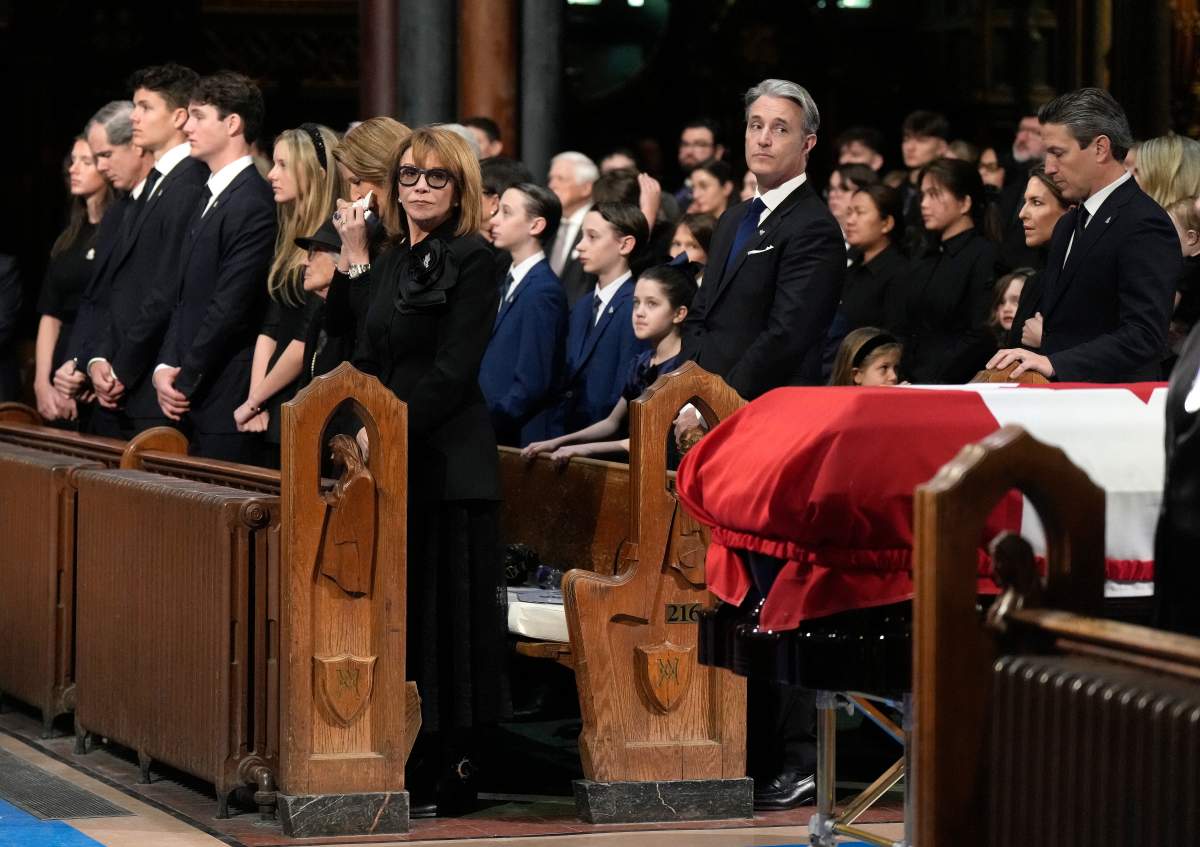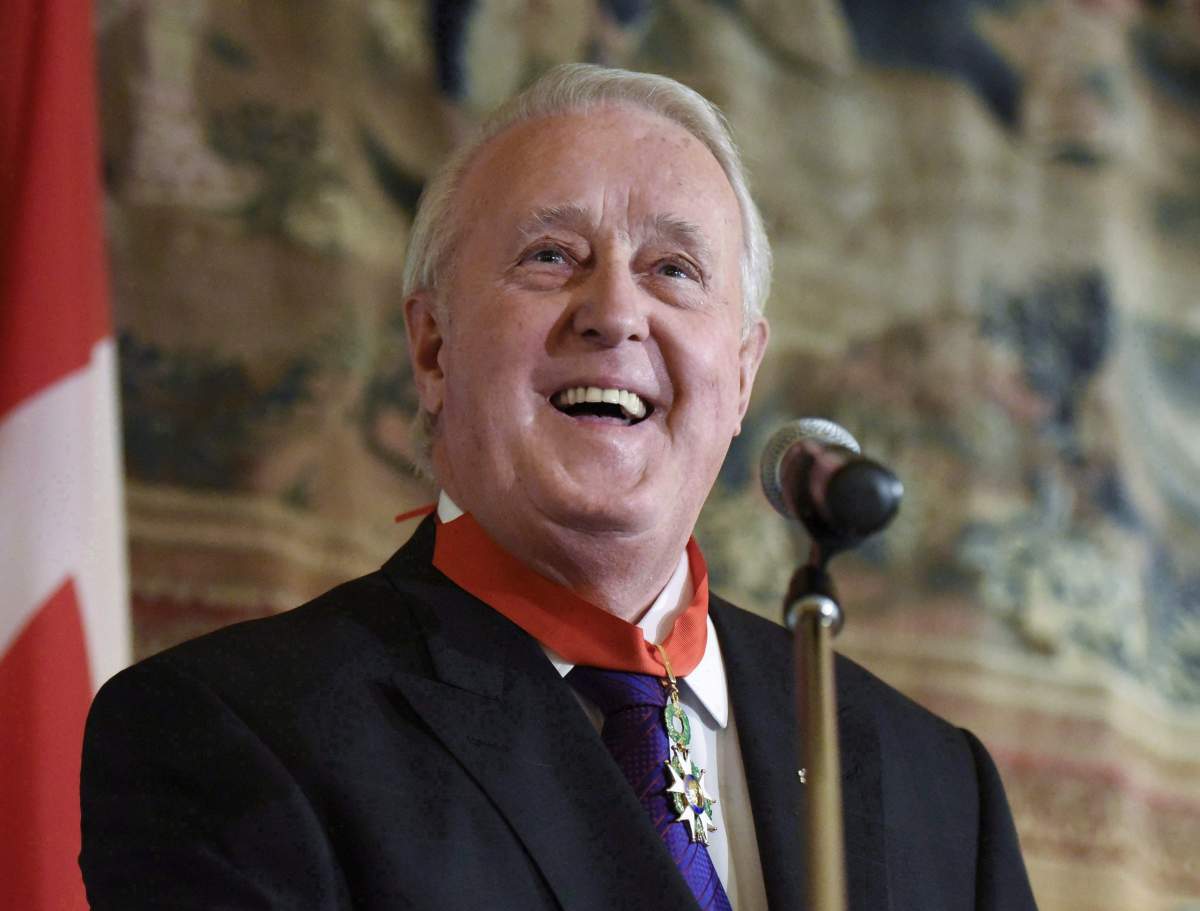Brian Mulroney’s political “destiny” was clear to those who knew him even from a young age — but it was his deep love for his family that leaves those closest “heartbroken” by his death, the former prime minister’s daughter said at his state funeral in Montreal.

“There was a destiny attached to my father that even in his youth, no one could deny,” said Caroline Mulroney, who delivered her father’s eulogy.
Brian Mulroney, who was Canada’s 18th prime minister, died at age 84 on Feb. 29 in Florida. He led the country as a Progressive Conservative from 1984 to 1993.
“To dad, everyone mattered,” said Caroline, recounting her father’s legacy and the pride he took in his Irish heritage and his upbringing in Baie Comeau, Quebec.
“He became a truly great prime minister and a world leader. To us, he was more than that. He was a truly great father. As his only daughter, he always made me feel special.”
“We are heartbroken by our loss. We adored him. I miss you daddy,” Caroline said through tears.
Mulroney’s state funeral was on Saturday at 11 a.m. eastern at Notre-Dame Basilica in Montreal (110 Notre-Dame St. W.).
Sen. Pamela Wallin spoke with Global National anchor Dawna Friesen as part of the Global News special coverage of the state funeral, saying Mulroney “will be missed on the political stage. He stayed involved.”
“Brian Mulroney was very partisan, as are all politicians. But it was a respectful partisanship … I think we’re all longing for those times. Those days are not what we’re experiencing right now.”

Prime Minister Justin Trudeau, Governor General of Canada Mary Simon and former prime minister Stephen Harper were some of a number of notable guests at the service.
“First and foremost, Brian was motivated by getting the big things right,” Trudeau said at the service, noting that the last time he was in the basilica was for his own father’s funeral more than 20 years ago. He said his thoughts were with the Mulroney children.
“Nothing brought him more joy than the loving family he built with Mila,” he said.
Trudeau remembered Mulroney as “the little guy from Baie Comeau.”
“Brian was never afraid to take on a fight … but as he put it himself, leaders must have vision, and they must find the courage to fight for the policies that will give that vision life,” he said.
Premiers from the provinces and territories were also in attendance, along with president of the Inuit Tapiriit Kanatami Natan Obed, president of the Métis National Council Cassidy Caron and Minister of Crown–Indigenous Relations Gary Anandasangaree.
Some international figures were present as well, such as Duchess of York Sarah Ferguson and ambassadors from around the world including the United States, Israel and Haiti. The high commissioner of South Africa, Rieaz Shaik, was also present.

A number of former Quebec premiers participated as honorary pallbearers, including Lucien Bouchard, Pierre Marc Johnson, Pauline Marois and Philippe Couillard.
Former Quebec premier Jean Charest referred to Mulroney as “one of those rarest political leaders — and able to define an era as his own.”

Get daily National news
Mulroney “walked among the giants of the world,” recalled Charest, who was also the former Progressive Conservative cabinet minister under Mulroney.
Charest referred to Mulroney as “one of Canada’s greatest prime ministers and one of Canada’s true nation builders.” Mulroney “treated his political opponents with respect. They were not enemies,” he said.
“We live in a world that he helped shape. We live in a country that he helped build,” Charest said.

More notable attendees included Conservative Leader Pierre Poilievre, former Conservative leader Erin O’Toole, actor Ryan Reynolds, comedian Rick Mercer, Indigo CEO Heather Reisman, journalist Peter Mansbridge, as well as prominent Canadian figures including Geoff and Andrew Molson, Galen Weston Jr. and other business people and philanthropists.
Hockey legend Wayne Gretzky paid tribute to Mulroney and the friendship they shared both when he was playing in the NHL and afterward.
“In politics and hockey, you fight, you battle, you drive. I’m so proud to be Canadian today to see past prime ministers here, the current prime minister, that’s what our country is all about,” Gretzky said.
“Coming together, being friendly, helping other people and paying respects. And Mr. Mulroney was one of the greatest prime ministers we’ve ever had. I always tell my friends around the world whether it’s funerals or weddings we watch on TV and we always say, you know what? We’re represented by Mila and Brian Mulroney. They make the country proud.”
Hundreds came to Ottawa this week to pay their respects while Mulroney lay in state at the Sir John A. Macdonald building, just steps from Parliament. Mulroney’s body was then taken to Montreal on Wednesday, where he lay in repose at Saint Patrick’s Basilica on Friday.
Born in Baie-Comeau, Que., in 1939, Mulroney will go down as one of Canada’s most prominent figures.
Here’s what occurred at Saturday’s service
Coverage plans from Global News
Global News hosted a live special in Montreal with Global National anchor Dawna Friesen, alongside Sen. Pamela Wallin, The West Block’s Mercedes Stephenson and Global National Quebec correspondent Mike Armstrong.
Before the ceremony began, a funeral cortege that included an RCMP mounted escort, a Canadian Armed Forces escort and guard of honour, the Royal Canadian Air Force Band, RCMP pallbearers and honorary pallbearers made its way to the Notre-Dame Basilica.
The ceremony featured religious components consisting of prayers, readings, hymns and communion, the government said. Eulogies are being made by Mulroney’s daughter, Caroline, as well as Prime Minister Justin Trudeau, prominent Quebec businessman Pierre Karl Péladeau, retired NHL star Wayne Gretzky, former U.S. secretary of state James Baker and former Quebec premier Jean Charest.
“During the ceremony, musical interludes will be performed by members of the Orchestre symphonique de Montréal (OSM) and the OSM Chorus, led by internationally renowned conductor Rafael Payare,” the federal government said.
“Canadian artists including The Tenors, Marc Hervieux, Marie-Josée Lord, and Elizabeth Theodora Lapham, granddaughter of the Right Honourable Brian Mulroney, will also perform. Some of the performances will be accompanied by Scott Price on the piano.”

A 19-gun salute was conducted at the end of the ceremony from the Clock Tower Pier in the Old Port of Montréal.
Canadian flags, which have been flying at half-mast on the Peace Tower and at all federal buildings and establishments in Canada since Feb. 29, will remain so until sunset on Saturday.
On Saturday, Corus Radio talk show host Roy Green will also provide a complete funeral recap on The Roy Green Show from 2 to 3 p.m. eastern across all Corus AM stations in Canada.
Corus is the parent company of Global News.
The show will be followed by the special program, Remembering Former Prime Minister Brian Mulroney: A Family Tribute, hosted by the late prime minister’s son, Ben Mulroney. The show will feature special guests including former United States president Bill Clinton, former president George W. Bush, Gretzky, five-time Grammy award-winner Michael Bublé and renowned actress and singer Reba McEntire.
Mulroney's political legacy
Mulroney had a political career marked by both meteoric success and considerable challenges.
As the last elected Progressive Conservative prime minister, Mulroney stitched together a coalition of Red Tories, Western Conservatives and Quebec nationalists, temporarily ending the Liberal Party’s dominance in Quebec.
The 1984 general election saw Mulroney’s Progressive Conservatives thump John Turner’s Liberals, winning 211 seats in the House of Commons – more than 100 more than the PCs had when the election was called.
Mulroney won a second majority mandate in the 1988 election, which was largely fought over the question of free trade with the United States. Those trade talks would eventually led Canada into the North American Free Trade Agreement, one of Mulroney’s most significant legacies as prime minister.
“Throughout our history, trade has been critical to Canada’s livelihood. Now, almost one third of what we produce is exported. Few countries in the world are so dependent on trade. This trend ultimately threatens the jobs of many Canadians and the living standards of the nation as a whole,” Mulroney said in defence of the agreement in 1985.
Beyond trade, Mulroney was a vocal advocate for ending apartheid in South Africa, and helped lead global sanctions that contributed to ending the regime. He also championed environment issues, crafting an acid rain treaty with Ronald Regan’s administration and introducing the Canadian Environmental Protection Act.
But Mulroney’s popularity with voters began to unravel over domestic issues. The Meech Lake Accord, Mulroney’s attempt to renegotiate the Canadian Constitution with Quebec, fell apart in the early 1990’s – one of the precipitating factors to Quebec’s 1995 referendum to leave Canada.
Mulroney’s imposition of the Goods and Services Tax (GST) in 1991 added to his unpopularity – even if it would subsequently become an important part of balancing the federal budget after years of deficit spending under Pierre Elliot Trudeau and Mulroney’s governments.
Both led to the collapse of Mulroney’s popular support.

By November 1992, Mulroney’s popularity stood at 12 per cent with Canadian voters – the lowest of any prime minister in Canadian history. He announced his retirement from Canadian politics in February 1993.
His successor, Kim Campbell, led the Progressive Conservatives to a crushing defeat in the 1993 general election – going from majority government to holding just two seats in the House of Commons.
The conservative coalition that Mulroney managed to hold together collapsed, with the rise of the separatist Bloc Quebébécois, the Western Reform movement, and a diminished Red Tory contingent. The fractured conservative movement would spend more than a decade on the opposition benches, eventually leading to the creation of the modern Conservative Party – a deal between then-Progressive Conservative Leader Peter MacKay and Stephen Harper.
The tension within the Conservative Party remains present to this day.
After leaving office Mulroney found himself mired in scandal and under investigation by the RCMP for accepting more than $200,000 in kickbacks from German businessman Karlheinz Schreiber related to the sale of Airbus planes to Air Canada.
While Mulroney maintained the money had been paid for lobbying and consulting services, a federal commission found no evidence Mulroney had carried out those services.
But he returned to political prominence in recent years as an informal advisor to Justin Trudeau’s Liberal government on relations with Donald Trump’s administration, who aggressively demanded a renegotiation of NAFTA. Mulroney was a frequent commentator on news programs during the Trump administration, and was also not shy with advice for the Conservative Party in opposition.
Trudeau told reporters last month that Mulroney “was committed to this country, loved it with all his heart and served it for many, many years in many different ways.”
Former New Brunswick premier Frank McKenna said on The West Block earlier this month that Mulroney will always be considered “the greatest” prime minister in Atlantic Canada.
“I think when he’s judged by history, he’ll be considered one of our most consequential prime ministers by a long shot,” he said.
In a special memorial program airing Saturday on all Corus AM radio stations, Clinton praised Mulroney’s willingness to move ahead on the North American Free Trade Agreement (NAFTA) despite skepticism about the deal among the Canadian public at the time.
“You have to take some risks … and he was willing to do that,” Clinton told Global for the special Remembering Former Prime Minister Brian Mulroney: A Family Tribute.
“I still think we did the right thing with NAFTA, and I think the results prove it. And the fact (the deal) had to be upgraded after 25 years doesn’t bother me a bit.”
— with files from Global News’ Aaron D’Andrea and Alex Boutilier













Comments
Want to discuss? Please read our Commenting Policy first.